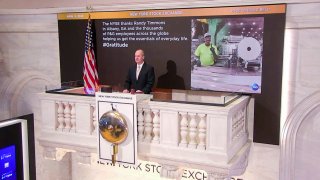
Asian shares are steady in quiet Good Friday trading after Wall Street closed out its best week in 45 years thanks to the Federal Reserve's titanic effort to support the economy through the coronavirus crisis.
Many regional markets were closed. Japan's Nikkei 225 index edged 0.1% lower to 19,326.78 and the Shanghai Composite index lost 0.4% to 2,814.52. In South Korea, the Kospi inched 0.1% higher to 1,838.47. Shares also rose in Taiwan and Malaysia.
Overnight, the U.S. central bank announced programs to provide up to $2.3 trillion in loans to households, local governments and businesses as the coronavirus outbreak tips the country into what economists say may be the worst recession in decades.
The Fed’s actions completely overshadowed a government report that another 6.6 million people applied for unemployment benefits last week. Stock investors expected such dismal numbers, and some are looking ahead to a possible reopening of the economy.
Get Tri-state area news delivered to your inbox.> Sign up for NBC New York's News Headlines newsletter.
“It looks like the Feds are on a mission to blow holes in every dam that stops the flow of credit. And it sure sounds like they have plenty more dynamite if needed," Stephen Innes of AxiCorp. said in a commentary.
The stock market is not the economy, and that distinction has become even more clear this week. For the week, the S&P 500 jumped 12.1%, its best performance since late 1974. U.S. markets will be closed for Good Friday.
Stock investors are continuously looking ahead to where the economy will be a few months or more in the future, which largely depends on the state of the coronavirus pandemic and on mass shutdowns meant to contain it.
Local
”The market is solely focused on the number of cases,” said Quincy Krosby, chief market strategist at Prudential Financial. “The question is when can the restrictions be lifted? That’s what the market is focused on, when does America open up for business again?”
The S&P 500 rose 39.84 points to 2,789.82. The Dow Jones Industrial Average added 1.2%, to 23,719.37, and the Nasdaq climbed 0.8% to 8,153.58.
While hopes are building that a plateau may be arriving for infections in several hotspots, it’s not assured.
In the meantime, the head of the International Monetary Fund said Thursday the global economy is set for its deepest recession since the Great Depression..
One in 10 U.S. workers has lost their jobs in the last three weeks.
”You typically have very strong rebounds, even in a bear market,” Krosby said of markets where stocks have fallen more than 20%. “The question is whether or not we see selling into this rebound, or can we continue to build on it.”
Gains Thursday were capped by another abrupt downdraft in the price of oil. Benchmark U.S. crude oil fell $2.33, or 9.3%, to settle at $22.76 per barrel after investors learned that Russia and members of OPEC had reached a preliminary agreement to reduce production by 10 million barrels a day. That is far short of what would be needed to offset the steep decline in demand because of the coronavirus shutdowns, said Dave Ernsberger, global head of commodities pricing at S&P Global Platts.
“What this was is a case of spectacular disappointment,” Ernsberger said. “In the oil market today, 20 million barrels of oil demand just got blown off the face of the Earth by the coronavirus. It’s gone, and they can’t even begin to paper over that with what they agreed on today.”
Brent crude fell $1.36, or 4.1%, to $31.48 per barrel. Oil markets were closed Friday.
In currency trading, the dollar fetched 108.50 Japanese yen, up from 108.46 yen on Thursday. The euro edged higher to $1.0936 from $1.0931.
___
This story has been updated to correct the closing number for the S&P 500 index. It ended at 2,789.82, not 2,789.92.
___
AP Business Writers Stan Choe and Alex Veiga contributed.



